Professional Scepticism in Auditing: A Critical Evaluation
VerifiedAdded on 2022/08/14
|13
|3475
|14
Essay
AI Summary
This essay critically evaluates the concept of professional scepticism, a crucial skill for auditors throughout the audit process. It defines professional scepticism and highlights its importance in maintaining audit quality, detecting errors, and ensuring the reliability of financial statements. The essay discusses the current thinking on the need for professional scepticism, emphasizing the increasing reliance on judgment in financial reporting and the impact of global financial crises. It also explores the incentives that may lead auditors to act without professional scepticism, such as workload pressures, client relationships, and the pursuit of higher fees, providing examples from corporate collapses like Enron, Lehman Brothers, and WorldCom. The essay concludes by emphasizing the need for auditors to adopt and apply professional scepticism to safeguard the trustworthiness of audit opinions and maintain public confidence in the audit profession.
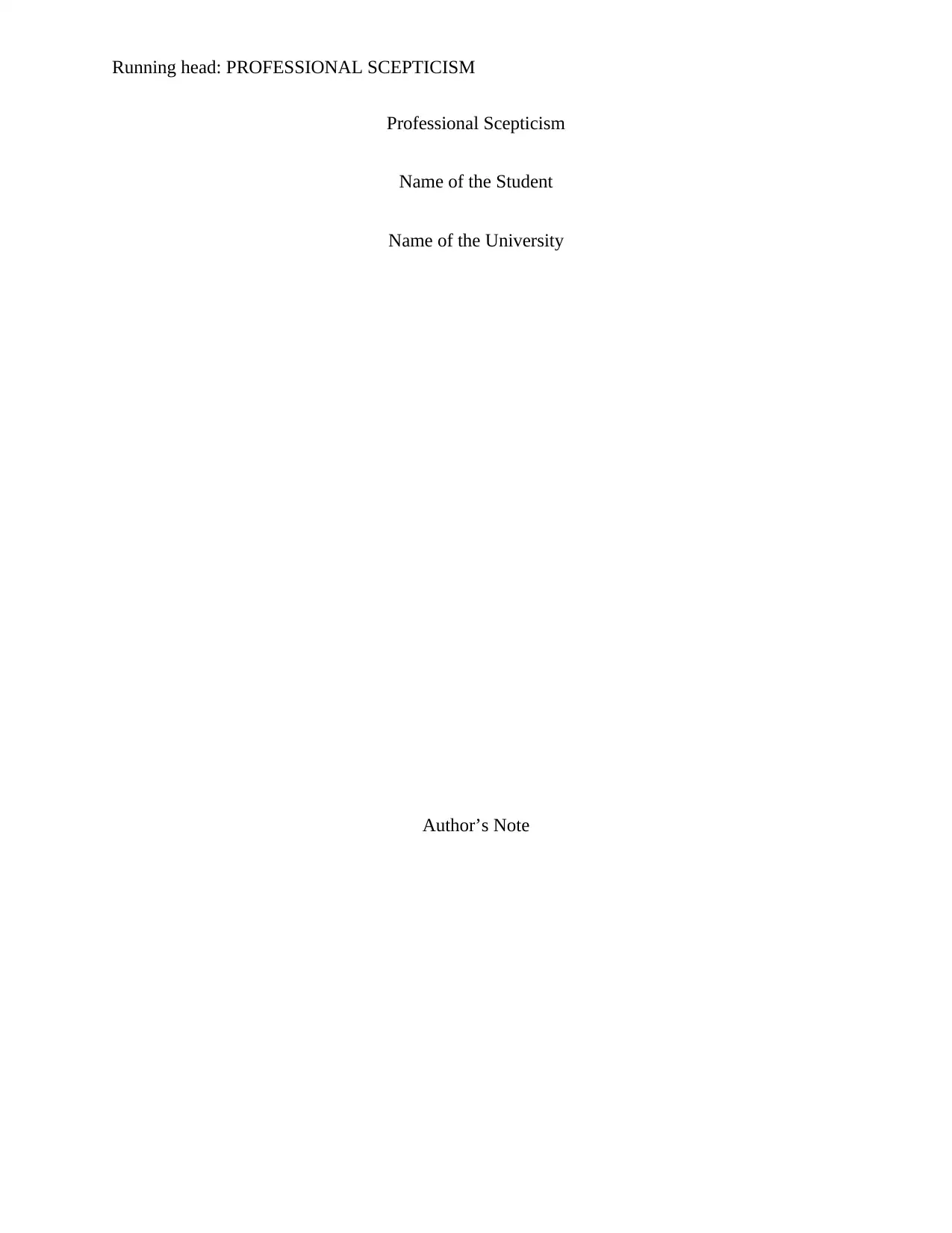
Running head: PROFESSIONAL SCEPTICISM
Professional Scepticism
Name of the Student
Name of the University
Author’s Note
Professional Scepticism
Name of the Student
Name of the University
Author’s Note
Paraphrase This Document
Need a fresh take? Get an instant paraphrase of this document with our AI Paraphraser
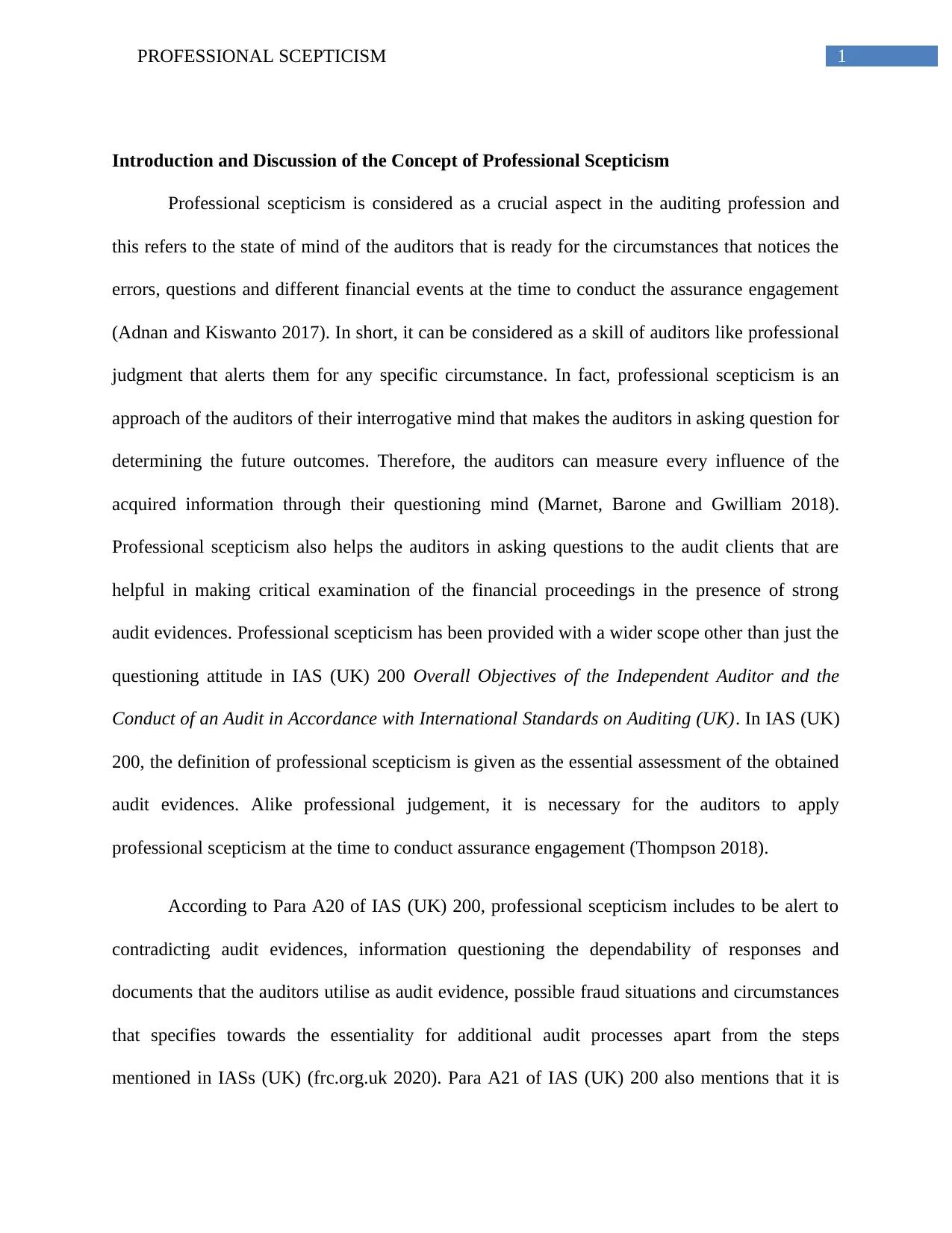
1PROFESSIONAL SCEPTICISM
Introduction and Discussion of the Concept of Professional Scepticism
Professional scepticism is considered as a crucial aspect in the auditing profession and
this refers to the state of mind of the auditors that is ready for the circumstances that notices the
errors, questions and different financial events at the time to conduct the assurance engagement
(Adnan and Kiswanto 2017). In short, it can be considered as a skill of auditors like professional
judgment that alerts them for any specific circumstance. In fact, professional scepticism is an
approach of the auditors of their interrogative mind that makes the auditors in asking question for
determining the future outcomes. Therefore, the auditors can measure every influence of the
acquired information through their questioning mind (Marnet, Barone and Gwilliam 2018).
Professional scepticism also helps the auditors in asking questions to the audit clients that are
helpful in making critical examination of the financial proceedings in the presence of strong
audit evidences. Professional scepticism has been provided with a wider scope other than just the
questioning attitude in IAS (UK) 200 Overall Objectives of the Independent Auditor and the
Conduct of an Audit in Accordance with International Standards on Auditing (UK). In IAS (UK)
200, the definition of professional scepticism is given as the essential assessment of the obtained
audit evidences. Alike professional judgement, it is necessary for the auditors to apply
professional scepticism at the time to conduct assurance engagement (Thompson 2018).
According to Para A20 of IAS (UK) 200, professional scepticism includes to be alert to
contradicting audit evidences, information questioning the dependability of responses and
documents that the auditors utilise as audit evidence, possible fraud situations and circumstances
that specifies towards the essentiality for additional audit processes apart from the steps
mentioned in IASs (UK) (frc.org.uk 2020). Para A21 of IAS (UK) 200 also mentions that it is
Introduction and Discussion of the Concept of Professional Scepticism
Professional scepticism is considered as a crucial aspect in the auditing profession and
this refers to the state of mind of the auditors that is ready for the circumstances that notices the
errors, questions and different financial events at the time to conduct the assurance engagement
(Adnan and Kiswanto 2017). In short, it can be considered as a skill of auditors like professional
judgment that alerts them for any specific circumstance. In fact, professional scepticism is an
approach of the auditors of their interrogative mind that makes the auditors in asking question for
determining the future outcomes. Therefore, the auditors can measure every influence of the
acquired information through their questioning mind (Marnet, Barone and Gwilliam 2018).
Professional scepticism also helps the auditors in asking questions to the audit clients that are
helpful in making critical examination of the financial proceedings in the presence of strong
audit evidences. Professional scepticism has been provided with a wider scope other than just the
questioning attitude in IAS (UK) 200 Overall Objectives of the Independent Auditor and the
Conduct of an Audit in Accordance with International Standards on Auditing (UK). In IAS (UK)
200, the definition of professional scepticism is given as the essential assessment of the obtained
audit evidences. Alike professional judgement, it is necessary for the auditors to apply
professional scepticism at the time to conduct assurance engagement (Thompson 2018).
According to Para A20 of IAS (UK) 200, professional scepticism includes to be alert to
contradicting audit evidences, information questioning the dependability of responses and
documents that the auditors utilise as audit evidence, possible fraud situations and circumstances
that specifies towards the essentiality for additional audit processes apart from the steps
mentioned in IASs (UK) (frc.org.uk 2020). Para A21 of IAS (UK) 200 also mentions that it is
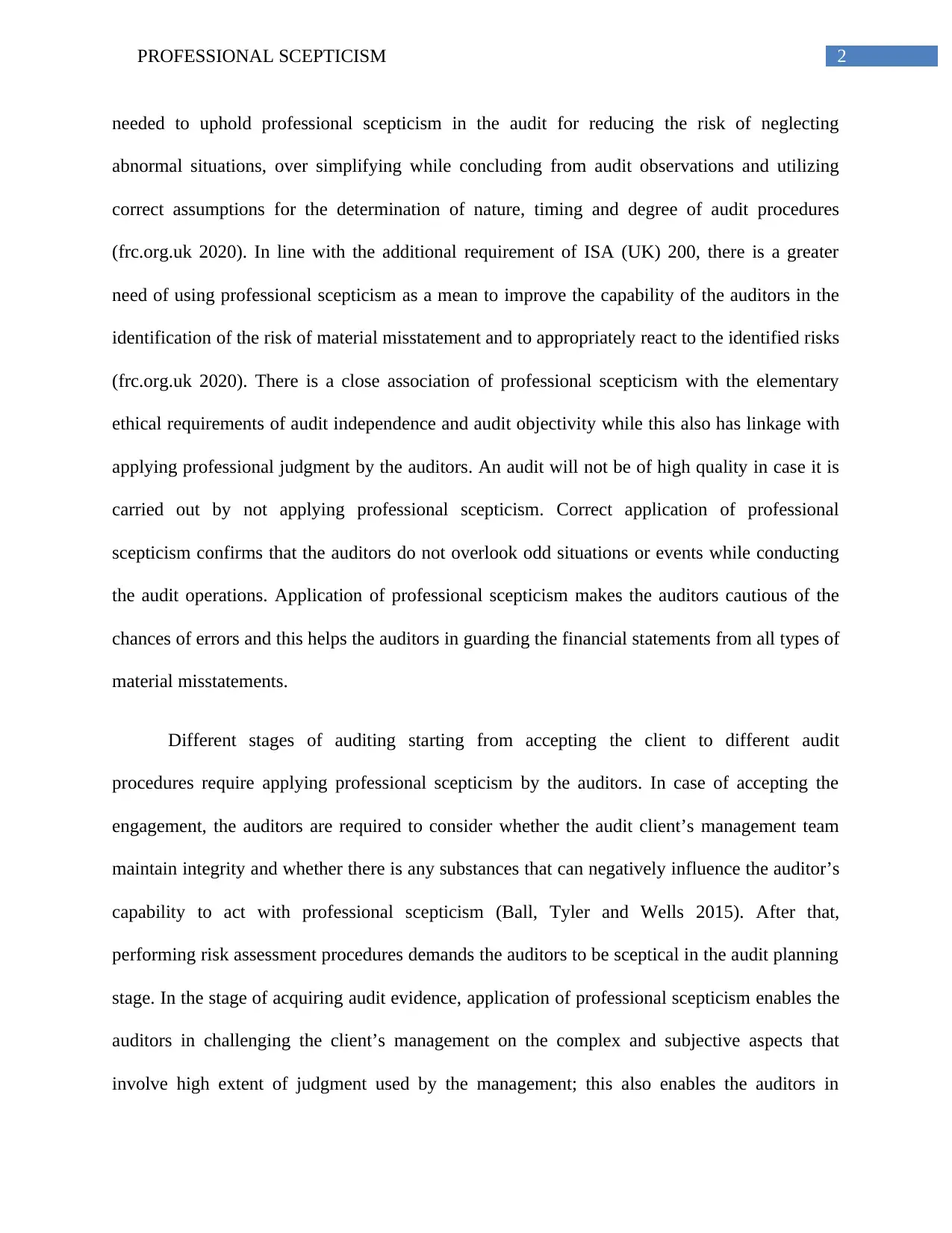
2PROFESSIONAL SCEPTICISM
needed to uphold professional scepticism in the audit for reducing the risk of neglecting
abnormal situations, over simplifying while concluding from audit observations and utilizing
correct assumptions for the determination of nature, timing and degree of audit procedures
(frc.org.uk 2020). In line with the additional requirement of ISA (UK) 200, there is a greater
need of using professional scepticism as a mean to improve the capability of the auditors in the
identification of the risk of material misstatement and to appropriately react to the identified risks
(frc.org.uk 2020). There is a close association of professional scepticism with the elementary
ethical requirements of audit independence and audit objectivity while this also has linkage with
applying professional judgment by the auditors. An audit will not be of high quality in case it is
carried out by not applying professional scepticism. Correct application of professional
scepticism confirms that the auditors do not overlook odd situations or events while conducting
the audit operations. Application of professional scepticism makes the auditors cautious of the
chances of errors and this helps the auditors in guarding the financial statements from all types of
material misstatements.
Different stages of auditing starting from accepting the client to different audit
procedures require applying professional scepticism by the auditors. In case of accepting the
engagement, the auditors are required to consider whether the audit client’s management team
maintain integrity and whether there is any substances that can negatively influence the auditor’s
capability to act with professional scepticism (Ball, Tyler and Wells 2015). After that,
performing risk assessment procedures demands the auditors to be sceptical in the audit planning
stage. In the stage of acquiring audit evidence, application of professional scepticism enables the
auditors in challenging the client’s management on the complex and subjective aspects that
involve high extent of judgment used by the management; this also enables the auditors in
needed to uphold professional scepticism in the audit for reducing the risk of neglecting
abnormal situations, over simplifying while concluding from audit observations and utilizing
correct assumptions for the determination of nature, timing and degree of audit procedures
(frc.org.uk 2020). In line with the additional requirement of ISA (UK) 200, there is a greater
need of using professional scepticism as a mean to improve the capability of the auditors in the
identification of the risk of material misstatement and to appropriately react to the identified risks
(frc.org.uk 2020). There is a close association of professional scepticism with the elementary
ethical requirements of audit independence and audit objectivity while this also has linkage with
applying professional judgment by the auditors. An audit will not be of high quality in case it is
carried out by not applying professional scepticism. Correct application of professional
scepticism confirms that the auditors do not overlook odd situations or events while conducting
the audit operations. Application of professional scepticism makes the auditors cautious of the
chances of errors and this helps the auditors in guarding the financial statements from all types of
material misstatements.
Different stages of auditing starting from accepting the client to different audit
procedures require applying professional scepticism by the auditors. In case of accepting the
engagement, the auditors are required to consider whether the audit client’s management team
maintain integrity and whether there is any substances that can negatively influence the auditor’s
capability to act with professional scepticism (Ball, Tyler and Wells 2015). After that,
performing risk assessment procedures demands the auditors to be sceptical in the audit planning
stage. In the stage of acquiring audit evidence, application of professional scepticism enables the
auditors in challenging the client’s management on the complex and subjective aspects that
involve high extent of judgment used by the management; this also enables the auditors in
⊘ This is a preview!⊘
Do you want full access?
Subscribe today to unlock all pages.

Trusted by 1+ million students worldwide
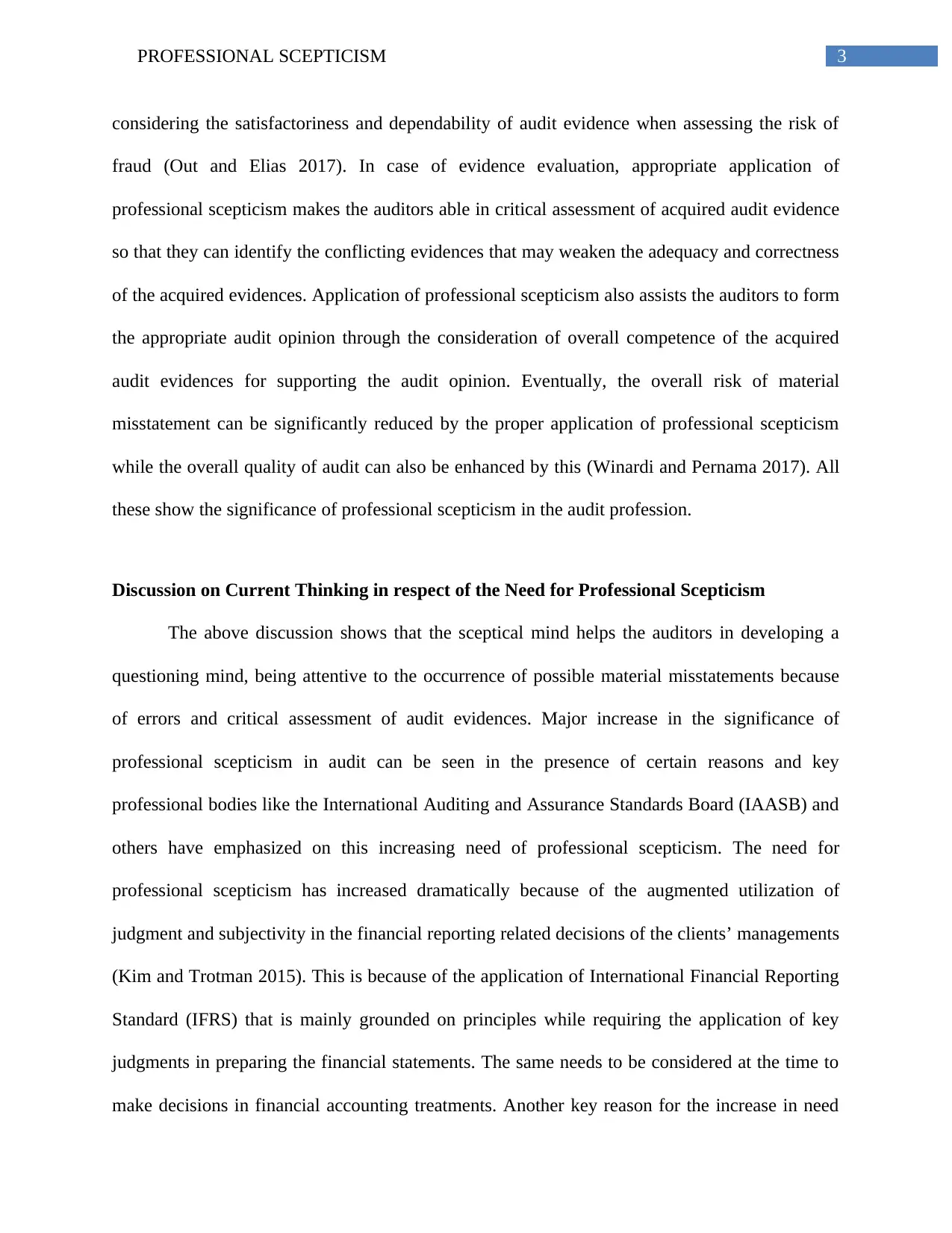
3PROFESSIONAL SCEPTICISM
considering the satisfactoriness and dependability of audit evidence when assessing the risk of
fraud (Out and Elias 2017). In case of evidence evaluation, appropriate application of
professional scepticism makes the auditors able in critical assessment of acquired audit evidence
so that they can identify the conflicting evidences that may weaken the adequacy and correctness
of the acquired evidences. Application of professional scepticism also assists the auditors to form
the appropriate audit opinion through the consideration of overall competence of the acquired
audit evidences for supporting the audit opinion. Eventually, the overall risk of material
misstatement can be significantly reduced by the proper application of professional scepticism
while the overall quality of audit can also be enhanced by this (Winardi and Pernama 2017). All
these show the significance of professional scepticism in the audit profession.
Discussion on Current Thinking in respect of the Need for Professional Scepticism
The above discussion shows that the sceptical mind helps the auditors in developing a
questioning mind, being attentive to the occurrence of possible material misstatements because
of errors and critical assessment of audit evidences. Major increase in the significance of
professional scepticism in audit can be seen in the presence of certain reasons and key
professional bodies like the International Auditing and Assurance Standards Board (IAASB) and
others have emphasized on this increasing need of professional scepticism. The need for
professional scepticism has increased dramatically because of the augmented utilization of
judgment and subjectivity in the financial reporting related decisions of the clients’ managements
(Kim and Trotman 2015). This is because of the application of International Financial Reporting
Standard (IFRS) that is mainly grounded on principles while requiring the application of key
judgments in preparing the financial statements. The same needs to be considered at the time to
make decisions in financial accounting treatments. Another key reason for the increase in need
considering the satisfactoriness and dependability of audit evidence when assessing the risk of
fraud (Out and Elias 2017). In case of evidence evaluation, appropriate application of
professional scepticism makes the auditors able in critical assessment of acquired audit evidence
so that they can identify the conflicting evidences that may weaken the adequacy and correctness
of the acquired evidences. Application of professional scepticism also assists the auditors to form
the appropriate audit opinion through the consideration of overall competence of the acquired
audit evidences for supporting the audit opinion. Eventually, the overall risk of material
misstatement can be significantly reduced by the proper application of professional scepticism
while the overall quality of audit can also be enhanced by this (Winardi and Pernama 2017). All
these show the significance of professional scepticism in the audit profession.
Discussion on Current Thinking in respect of the Need for Professional Scepticism
The above discussion shows that the sceptical mind helps the auditors in developing a
questioning mind, being attentive to the occurrence of possible material misstatements because
of errors and critical assessment of audit evidences. Major increase in the significance of
professional scepticism in audit can be seen in the presence of certain reasons and key
professional bodies like the International Auditing and Assurance Standards Board (IAASB) and
others have emphasized on this increasing need of professional scepticism. The need for
professional scepticism has increased dramatically because of the augmented utilization of
judgment and subjectivity in the financial reporting related decisions of the clients’ managements
(Kim and Trotman 2015). This is because of the application of International Financial Reporting
Standard (IFRS) that is mainly grounded on principles while requiring the application of key
judgments in preparing the financial statements. The same needs to be considered at the time to
make decisions in financial accounting treatments. Another key reason for the increase in need
Paraphrase This Document
Need a fresh take? Get an instant paraphrase of this document with our AI Paraphraser
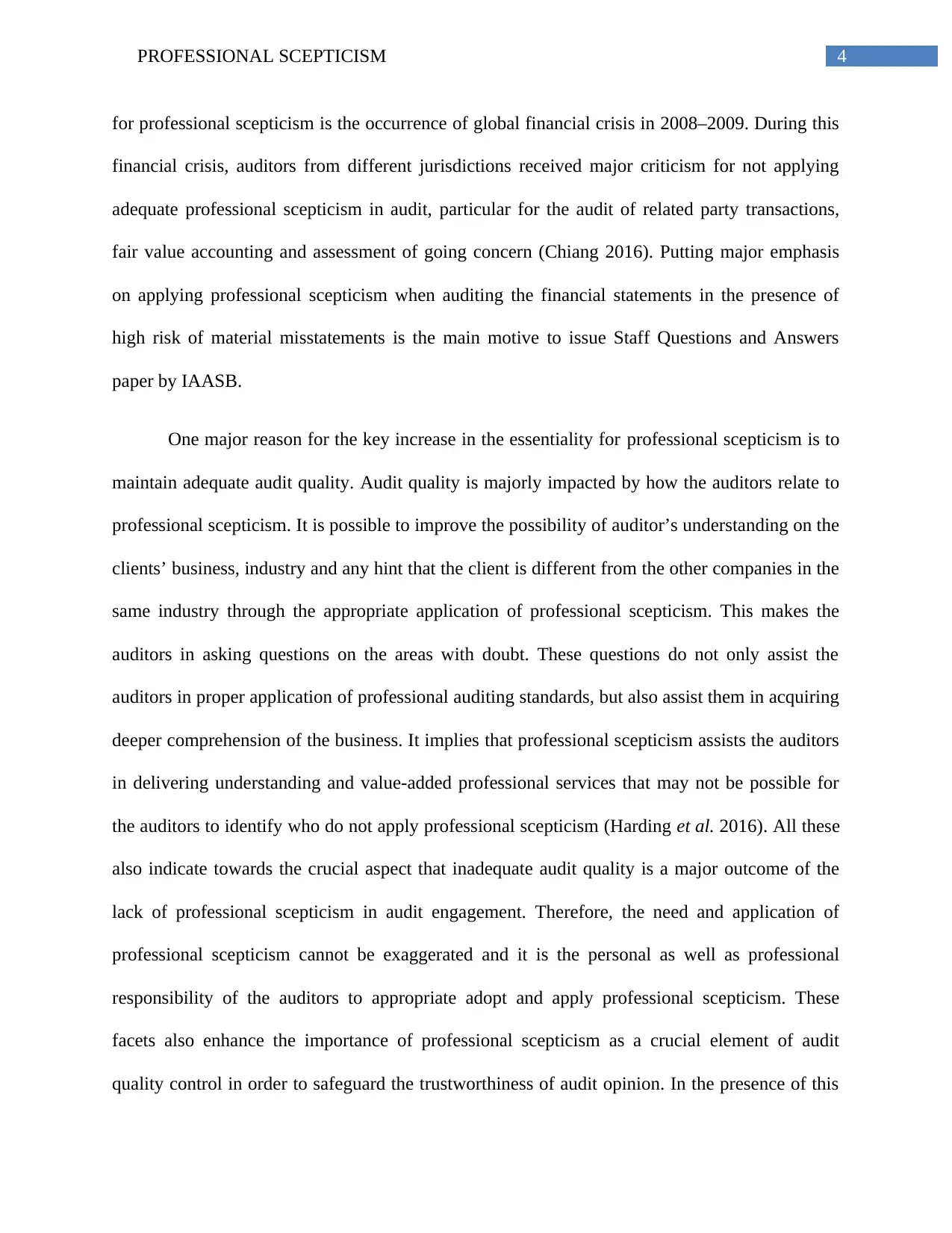
4PROFESSIONAL SCEPTICISM
for professional scepticism is the occurrence of global financial crisis in 2008–2009. During this
financial crisis, auditors from different jurisdictions received major criticism for not applying
adequate professional scepticism in audit, particular for the audit of related party transactions,
fair value accounting and assessment of going concern (Chiang 2016). Putting major emphasis
on applying professional scepticism when auditing the financial statements in the presence of
high risk of material misstatements is the main motive to issue Staff Questions and Answers
paper by IAASB.
One major reason for the key increase in the essentiality for professional scepticism is to
maintain adequate audit quality. Audit quality is majorly impacted by how the auditors relate to
professional scepticism. It is possible to improve the possibility of auditor’s understanding on the
clients’ business, industry and any hint that the client is different from the other companies in the
same industry through the appropriate application of professional scepticism. This makes the
auditors in asking questions on the areas with doubt. These questions do not only assist the
auditors in proper application of professional auditing standards, but also assist them in acquiring
deeper comprehension of the business. It implies that professional scepticism assists the auditors
in delivering understanding and value-added professional services that may not be possible for
the auditors to identify who do not apply professional scepticism (Harding et al. 2016). All these
also indicate towards the crucial aspect that inadequate audit quality is a major outcome of the
lack of professional scepticism in audit engagement. Therefore, the need and application of
professional scepticism cannot be exaggerated and it is the personal as well as professional
responsibility of the auditors to appropriate adopt and apply professional scepticism. These
facets also enhance the importance of professional scepticism as a crucial element of audit
quality control in order to safeguard the trustworthiness of audit opinion. In the presence of this
for professional scepticism is the occurrence of global financial crisis in 2008–2009. During this
financial crisis, auditors from different jurisdictions received major criticism for not applying
adequate professional scepticism in audit, particular for the audit of related party transactions,
fair value accounting and assessment of going concern (Chiang 2016). Putting major emphasis
on applying professional scepticism when auditing the financial statements in the presence of
high risk of material misstatements is the main motive to issue Staff Questions and Answers
paper by IAASB.
One major reason for the key increase in the essentiality for professional scepticism is to
maintain adequate audit quality. Audit quality is majorly impacted by how the auditors relate to
professional scepticism. It is possible to improve the possibility of auditor’s understanding on the
clients’ business, industry and any hint that the client is different from the other companies in the
same industry through the appropriate application of professional scepticism. This makes the
auditors in asking questions on the areas with doubt. These questions do not only assist the
auditors in proper application of professional auditing standards, but also assist them in acquiring
deeper comprehension of the business. It implies that professional scepticism assists the auditors
in delivering understanding and value-added professional services that may not be possible for
the auditors to identify who do not apply professional scepticism (Harding et al. 2016). All these
also indicate towards the crucial aspect that inadequate audit quality is a major outcome of the
lack of professional scepticism in audit engagement. Therefore, the need and application of
professional scepticism cannot be exaggerated and it is the personal as well as professional
responsibility of the auditors to appropriate adopt and apply professional scepticism. These
facets also enhance the importance of professional scepticism as a crucial element of audit
quality control in order to safeguard the trustworthiness of audit opinion. In the presence of this
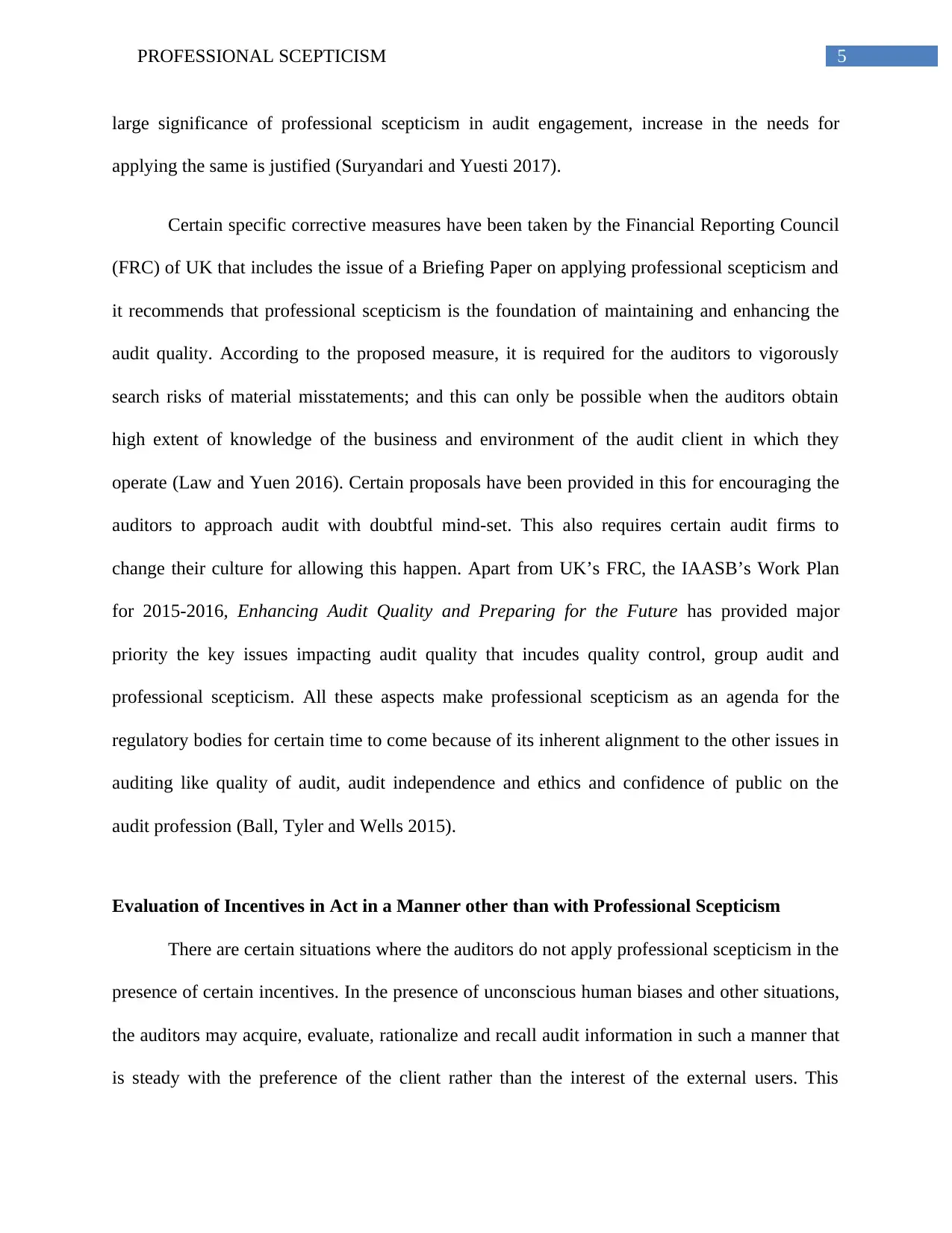
5PROFESSIONAL SCEPTICISM
large significance of professional scepticism in audit engagement, increase in the needs for
applying the same is justified (Suryandari and Yuesti 2017).
Certain specific corrective measures have been taken by the Financial Reporting Council
(FRC) of UK that includes the issue of a Briefing Paper on applying professional scepticism and
it recommends that professional scepticism is the foundation of maintaining and enhancing the
audit quality. According to the proposed measure, it is required for the auditors to vigorously
search risks of material misstatements; and this can only be possible when the auditors obtain
high extent of knowledge of the business and environment of the audit client in which they
operate (Law and Yuen 2016). Certain proposals have been provided in this for encouraging the
auditors to approach audit with doubtful mind-set. This also requires certain audit firms to
change their culture for allowing this happen. Apart from UK’s FRC, the IAASB’s Work Plan
for 2015-2016, Enhancing Audit Quality and Preparing for the Future has provided major
priority the key issues impacting audit quality that incudes quality control, group audit and
professional scepticism. All these aspects make professional scepticism as an agenda for the
regulatory bodies for certain time to come because of its inherent alignment to the other issues in
auditing like quality of audit, audit independence and ethics and confidence of public on the
audit profession (Ball, Tyler and Wells 2015).
Evaluation of Incentives in Act in a Manner other than with Professional Scepticism
There are certain situations where the auditors do not apply professional scepticism in the
presence of certain incentives. In the presence of unconscious human biases and other situations,
the auditors may acquire, evaluate, rationalize and recall audit information in such a manner that
is steady with the preference of the client rather than the interest of the external users. This
large significance of professional scepticism in audit engagement, increase in the needs for
applying the same is justified (Suryandari and Yuesti 2017).
Certain specific corrective measures have been taken by the Financial Reporting Council
(FRC) of UK that includes the issue of a Briefing Paper on applying professional scepticism and
it recommends that professional scepticism is the foundation of maintaining and enhancing the
audit quality. According to the proposed measure, it is required for the auditors to vigorously
search risks of material misstatements; and this can only be possible when the auditors obtain
high extent of knowledge of the business and environment of the audit client in which they
operate (Law and Yuen 2016). Certain proposals have been provided in this for encouraging the
auditors to approach audit with doubtful mind-set. This also requires certain audit firms to
change their culture for allowing this happen. Apart from UK’s FRC, the IAASB’s Work Plan
for 2015-2016, Enhancing Audit Quality and Preparing for the Future has provided major
priority the key issues impacting audit quality that incudes quality control, group audit and
professional scepticism. All these aspects make professional scepticism as an agenda for the
regulatory bodies for certain time to come because of its inherent alignment to the other issues in
auditing like quality of audit, audit independence and ethics and confidence of public on the
audit profession (Ball, Tyler and Wells 2015).
Evaluation of Incentives in Act in a Manner other than with Professional Scepticism
There are certain situations where the auditors do not apply professional scepticism in the
presence of certain incentives. In the presence of unconscious human biases and other situations,
the auditors may acquire, evaluate, rationalize and recall audit information in such a manner that
is steady with the preference of the client rather than the interest of the external users. This
⊘ This is a preview!⊘
Do you want full access?
Subscribe today to unlock all pages.

Trusted by 1+ million students worldwide
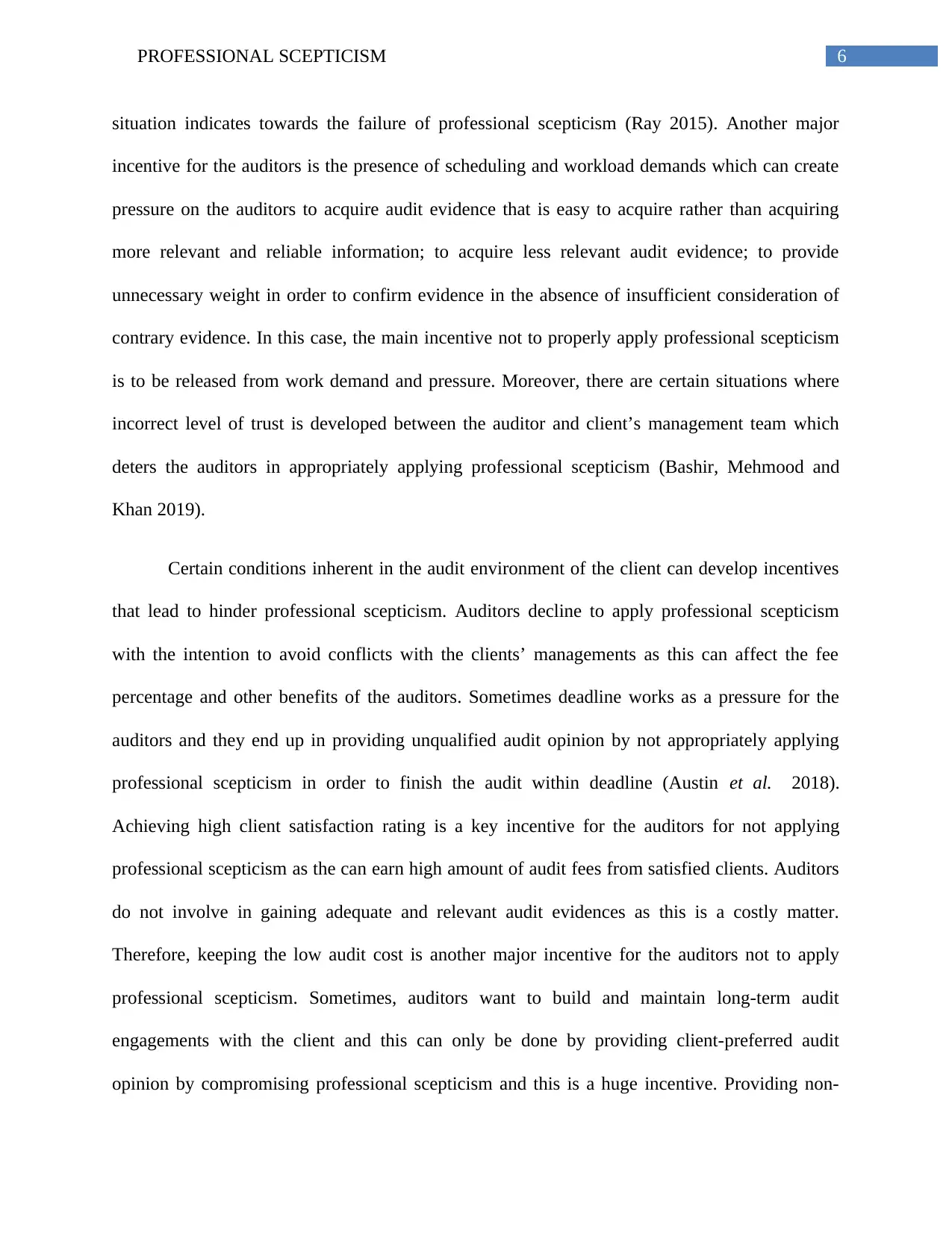
6PROFESSIONAL SCEPTICISM
situation indicates towards the failure of professional scepticism (Ray 2015). Another major
incentive for the auditors is the presence of scheduling and workload demands which can create
pressure on the auditors to acquire audit evidence that is easy to acquire rather than acquiring
more relevant and reliable information; to acquire less relevant audit evidence; to provide
unnecessary weight in order to confirm evidence in the absence of insufficient consideration of
contrary evidence. In this case, the main incentive not to properly apply professional scepticism
is to be released from work demand and pressure. Moreover, there are certain situations where
incorrect level of trust is developed between the auditor and client’s management team which
deters the auditors in appropriately applying professional scepticism (Bashir, Mehmood and
Khan 2019).
Certain conditions inherent in the audit environment of the client can develop incentives
that lead to hinder professional scepticism. Auditors decline to apply professional scepticism
with the intention to avoid conflicts with the clients’ managements as this can affect the fee
percentage and other benefits of the auditors. Sometimes deadline works as a pressure for the
auditors and they end up in providing unqualified audit opinion by not appropriately applying
professional scepticism in order to finish the audit within deadline (Austin et al. 2018).
Achieving high client satisfaction rating is a key incentive for the auditors for not applying
professional scepticism as the can earn high amount of audit fees from satisfied clients. Auditors
do not involve in gaining adequate and relevant audit evidences as this is a costly matter.
Therefore, keeping the low audit cost is another major incentive for the auditors not to apply
professional scepticism. Sometimes, auditors want to build and maintain long-term audit
engagements with the client and this can only be done by providing client-preferred audit
opinion by compromising professional scepticism and this is a huge incentive. Providing non-
situation indicates towards the failure of professional scepticism (Ray 2015). Another major
incentive for the auditors is the presence of scheduling and workload demands which can create
pressure on the auditors to acquire audit evidence that is easy to acquire rather than acquiring
more relevant and reliable information; to acquire less relevant audit evidence; to provide
unnecessary weight in order to confirm evidence in the absence of insufficient consideration of
contrary evidence. In this case, the main incentive not to properly apply professional scepticism
is to be released from work demand and pressure. Moreover, there are certain situations where
incorrect level of trust is developed between the auditor and client’s management team which
deters the auditors in appropriately applying professional scepticism (Bashir, Mehmood and
Khan 2019).
Certain conditions inherent in the audit environment of the client can develop incentives
that lead to hinder professional scepticism. Auditors decline to apply professional scepticism
with the intention to avoid conflicts with the clients’ managements as this can affect the fee
percentage and other benefits of the auditors. Sometimes deadline works as a pressure for the
auditors and they end up in providing unqualified audit opinion by not appropriately applying
professional scepticism in order to finish the audit within deadline (Austin et al. 2018).
Achieving high client satisfaction rating is a key incentive for the auditors for not applying
professional scepticism as the can earn high amount of audit fees from satisfied clients. Auditors
do not involve in gaining adequate and relevant audit evidences as this is a costly matter.
Therefore, keeping the low audit cost is another major incentive for the auditors not to apply
professional scepticism. Sometimes, auditors want to build and maintain long-term audit
engagements with the client and this can only be done by providing client-preferred audit
opinion by compromising professional scepticism and this is a huge incentive. Providing non-
Paraphrase This Document
Need a fresh take? Get an instant paraphrase of this document with our AI Paraphraser
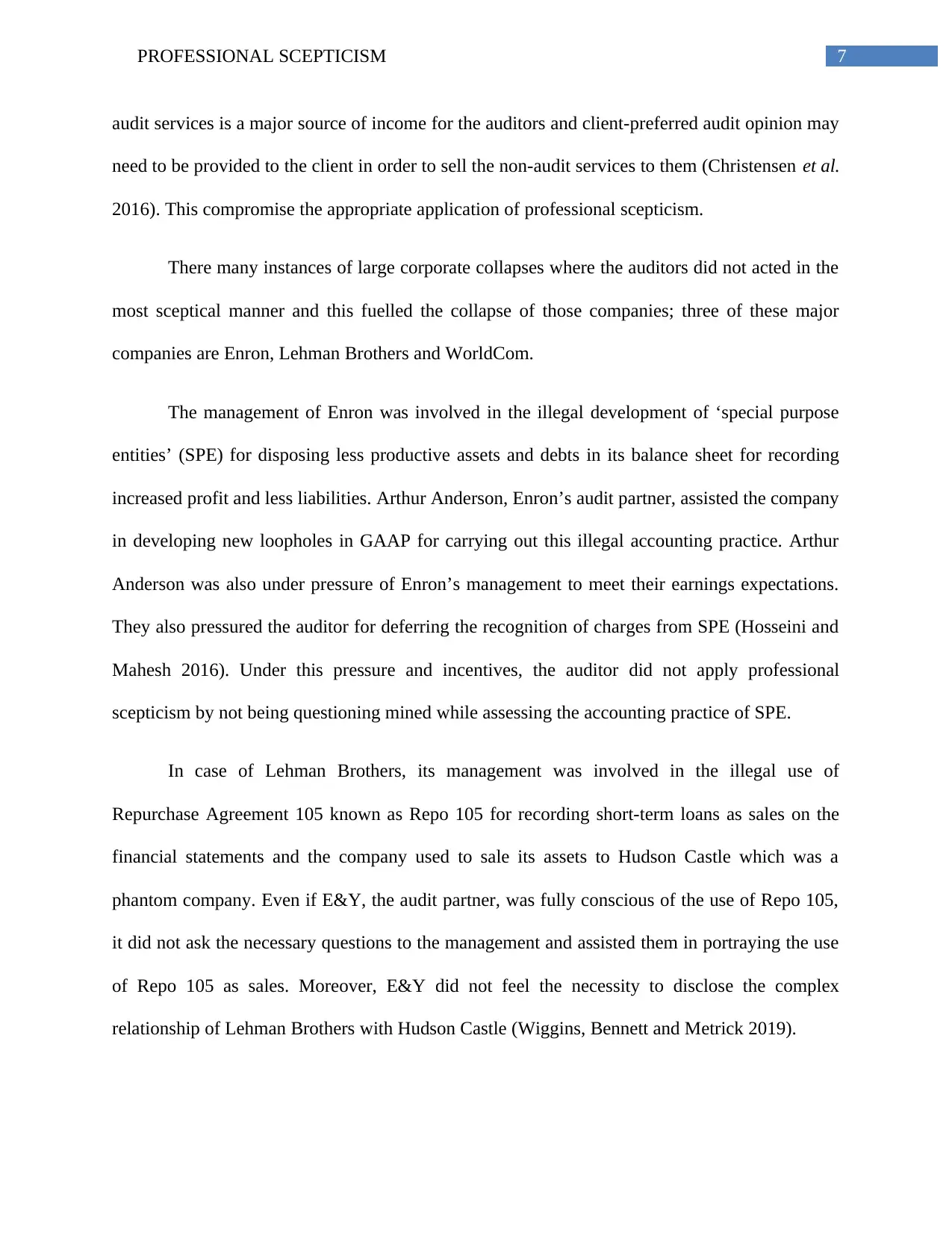
7PROFESSIONAL SCEPTICISM
audit services is a major source of income for the auditors and client-preferred audit opinion may
need to be provided to the client in order to sell the non-audit services to them (Christensen et al.
2016). This compromise the appropriate application of professional scepticism.
There many instances of large corporate collapses where the auditors did not acted in the
most sceptical manner and this fuelled the collapse of those companies; three of these major
companies are Enron, Lehman Brothers and WorldCom.
The management of Enron was involved in the illegal development of ‘special purpose
entities’ (SPE) for disposing less productive assets and debts in its balance sheet for recording
increased profit and less liabilities. Arthur Anderson, Enron’s audit partner, assisted the company
in developing new loopholes in GAAP for carrying out this illegal accounting practice. Arthur
Anderson was also under pressure of Enron’s management to meet their earnings expectations.
They also pressured the auditor for deferring the recognition of charges from SPE (Hosseini and
Mahesh 2016). Under this pressure and incentives, the auditor did not apply professional
scepticism by not being questioning mined while assessing the accounting practice of SPE.
In case of Lehman Brothers, its management was involved in the illegal use of
Repurchase Agreement 105 known as Repo 105 for recording short-term loans as sales on the
financial statements and the company used to sale its assets to Hudson Castle which was a
phantom company. Even if E&Y, the audit partner, was fully conscious of the use of Repo 105,
it did not ask the necessary questions to the management and assisted them in portraying the use
of Repo 105 as sales. Moreover, E&Y did not feel the necessity to disclose the complex
relationship of Lehman Brothers with Hudson Castle (Wiggins, Bennett and Metrick 2019).
audit services is a major source of income for the auditors and client-preferred audit opinion may
need to be provided to the client in order to sell the non-audit services to them (Christensen et al.
2016). This compromise the appropriate application of professional scepticism.
There many instances of large corporate collapses where the auditors did not acted in the
most sceptical manner and this fuelled the collapse of those companies; three of these major
companies are Enron, Lehman Brothers and WorldCom.
The management of Enron was involved in the illegal development of ‘special purpose
entities’ (SPE) for disposing less productive assets and debts in its balance sheet for recording
increased profit and less liabilities. Arthur Anderson, Enron’s audit partner, assisted the company
in developing new loopholes in GAAP for carrying out this illegal accounting practice. Arthur
Anderson was also under pressure of Enron’s management to meet their earnings expectations.
They also pressured the auditor for deferring the recognition of charges from SPE (Hosseini and
Mahesh 2016). Under this pressure and incentives, the auditor did not apply professional
scepticism by not being questioning mined while assessing the accounting practice of SPE.
In case of Lehman Brothers, its management was involved in the illegal use of
Repurchase Agreement 105 known as Repo 105 for recording short-term loans as sales on the
financial statements and the company used to sale its assets to Hudson Castle which was a
phantom company. Even if E&Y, the audit partner, was fully conscious of the use of Repo 105,
it did not ask the necessary questions to the management and assisted them in portraying the use
of Repo 105 as sales. Moreover, E&Y did not feel the necessity to disclose the complex
relationship of Lehman Brothers with Hudson Castle (Wiggins, Bennett and Metrick 2019).
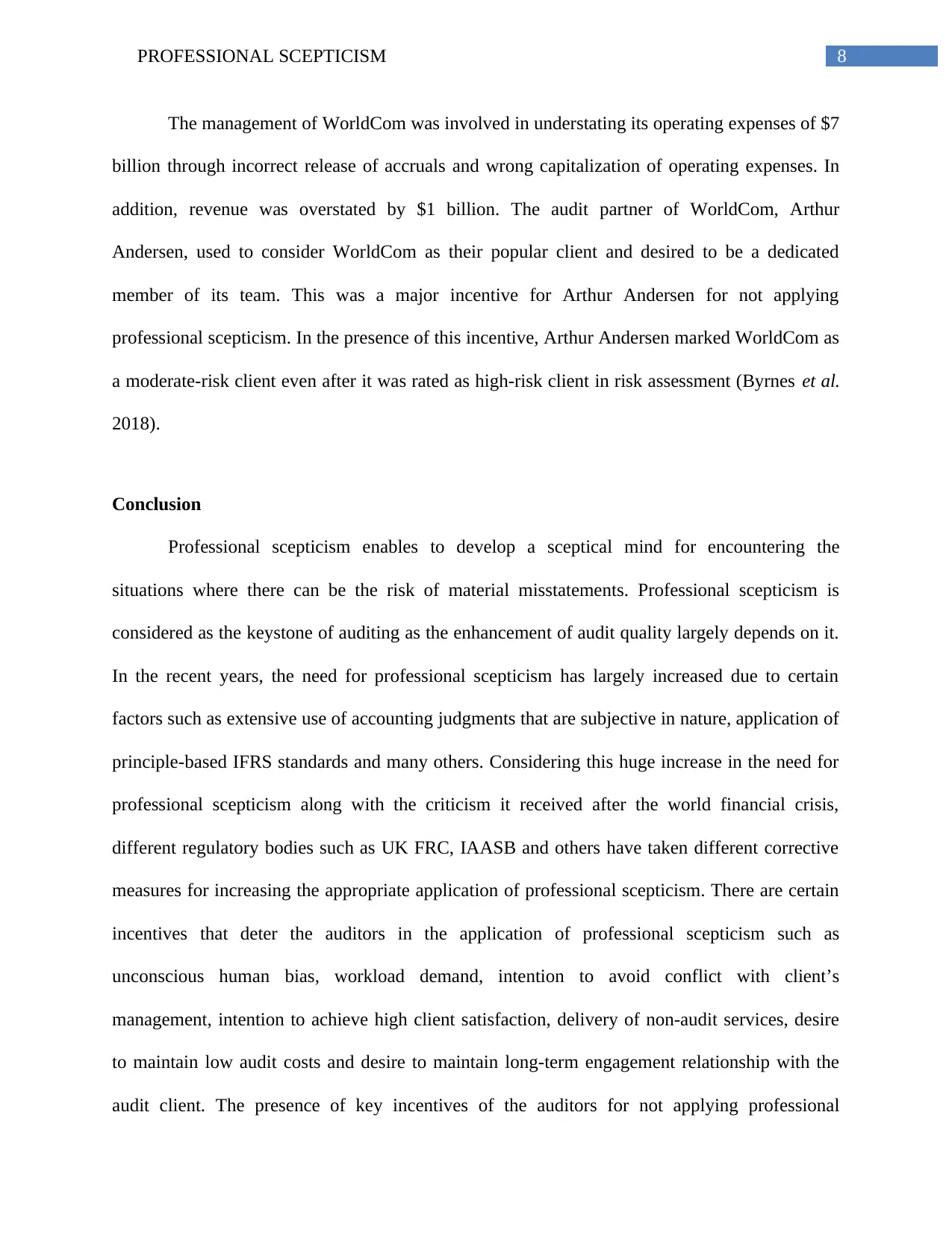
8PROFESSIONAL SCEPTICISM
The management of WorldCom was involved in understating its operating expenses of $7
billion through incorrect release of accruals and wrong capitalization of operating expenses. In
addition, revenue was overstated by $1 billion. The audit partner of WorldCom, Arthur
Andersen, used to consider WorldCom as their popular client and desired to be a dedicated
member of its team. This was a major incentive for Arthur Andersen for not applying
professional scepticism. In the presence of this incentive, Arthur Andersen marked WorldCom as
a moderate-risk client even after it was rated as high-risk client in risk assessment (Byrnes et al.
2018).
Conclusion
Professional scepticism enables to develop a sceptical mind for encountering the
situations where there can be the risk of material misstatements. Professional scepticism is
considered as the keystone of auditing as the enhancement of audit quality largely depends on it.
In the recent years, the need for professional scepticism has largely increased due to certain
factors such as extensive use of accounting judgments that are subjective in nature, application of
principle-based IFRS standards and many others. Considering this huge increase in the need for
professional scepticism along with the criticism it received after the world financial crisis,
different regulatory bodies such as UK FRC, IAASB and others have taken different corrective
measures for increasing the appropriate application of professional scepticism. There are certain
incentives that deter the auditors in the application of professional scepticism such as
unconscious human bias, workload demand, intention to avoid conflict with client’s
management, intention to achieve high client satisfaction, delivery of non-audit services, desire
to maintain low audit costs and desire to maintain long-term engagement relationship with the
audit client. The presence of key incentives of the auditors for not applying professional
The management of WorldCom was involved in understating its operating expenses of $7
billion through incorrect release of accruals and wrong capitalization of operating expenses. In
addition, revenue was overstated by $1 billion. The audit partner of WorldCom, Arthur
Andersen, used to consider WorldCom as their popular client and desired to be a dedicated
member of its team. This was a major incentive for Arthur Andersen for not applying
professional scepticism. In the presence of this incentive, Arthur Andersen marked WorldCom as
a moderate-risk client even after it was rated as high-risk client in risk assessment (Byrnes et al.
2018).
Conclusion
Professional scepticism enables to develop a sceptical mind for encountering the
situations where there can be the risk of material misstatements. Professional scepticism is
considered as the keystone of auditing as the enhancement of audit quality largely depends on it.
In the recent years, the need for professional scepticism has largely increased due to certain
factors such as extensive use of accounting judgments that are subjective in nature, application of
principle-based IFRS standards and many others. Considering this huge increase in the need for
professional scepticism along with the criticism it received after the world financial crisis,
different regulatory bodies such as UK FRC, IAASB and others have taken different corrective
measures for increasing the appropriate application of professional scepticism. There are certain
incentives that deter the auditors in the application of professional scepticism such as
unconscious human bias, workload demand, intention to avoid conflict with client’s
management, intention to achieve high client satisfaction, delivery of non-audit services, desire
to maintain low audit costs and desire to maintain long-term engagement relationship with the
audit client. The presence of key incentives of the auditors for not applying professional
⊘ This is a preview!⊘
Do you want full access?
Subscribe today to unlock all pages.

Trusted by 1+ million students worldwide
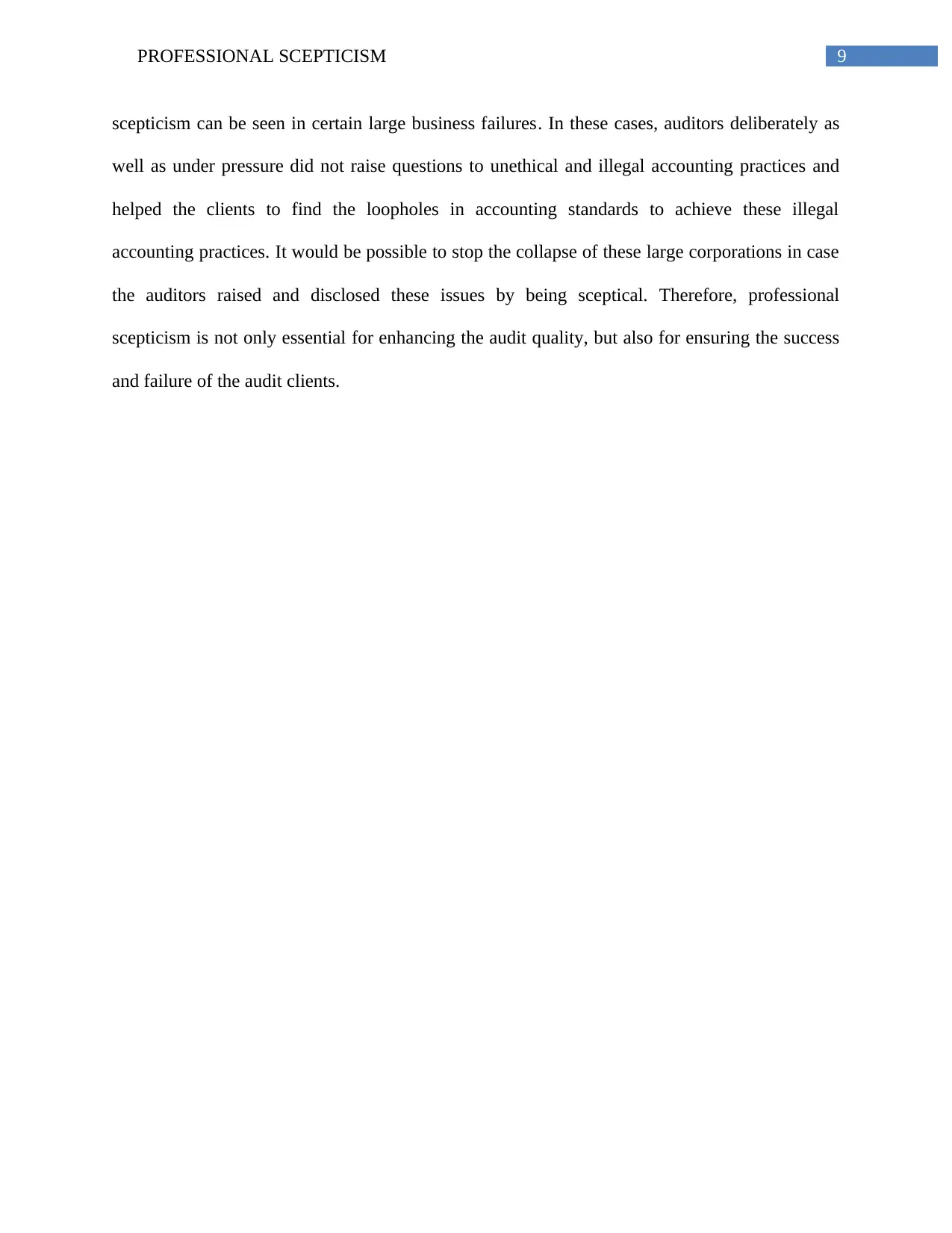
9PROFESSIONAL SCEPTICISM
scepticism can be seen in certain large business failures. In these cases, auditors deliberately as
well as under pressure did not raise questions to unethical and illegal accounting practices and
helped the clients to find the loopholes in accounting standards to achieve these illegal
accounting practices. It would be possible to stop the collapse of these large corporations in case
the auditors raised and disclosed these issues by being sceptical. Therefore, professional
scepticism is not only essential for enhancing the audit quality, but also for ensuring the success
and failure of the audit clients.
scepticism can be seen in certain large business failures. In these cases, auditors deliberately as
well as under pressure did not raise questions to unethical and illegal accounting practices and
helped the clients to find the loopholes in accounting standards to achieve these illegal
accounting practices. It would be possible to stop the collapse of these large corporations in case
the auditors raised and disclosed these issues by being sceptical. Therefore, professional
scepticism is not only essential for enhancing the audit quality, but also for ensuring the success
and failure of the audit clients.
Paraphrase This Document
Need a fresh take? Get an instant paraphrase of this document with our AI Paraphraser
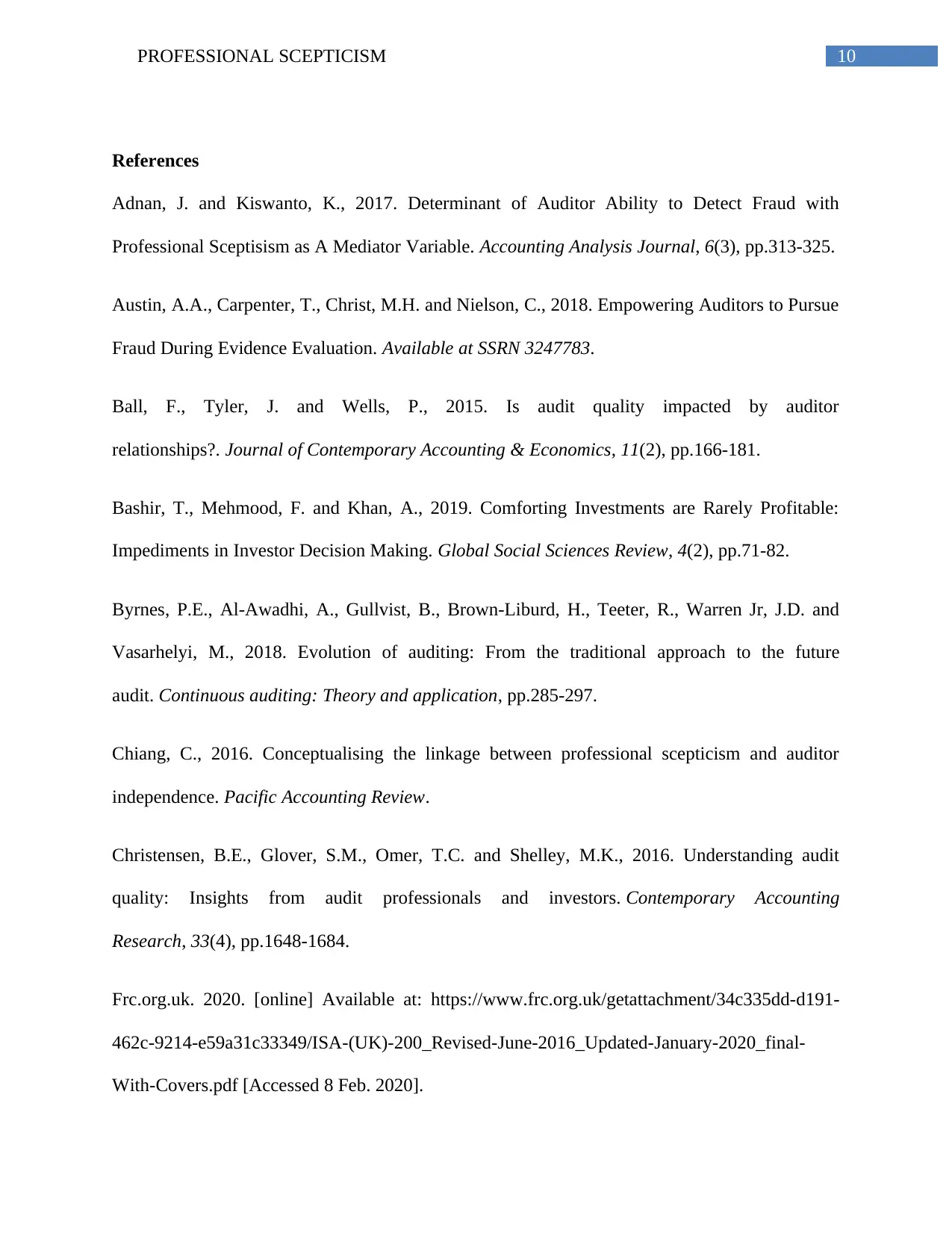
10PROFESSIONAL SCEPTICISM
References
Adnan, J. and Kiswanto, K., 2017. Determinant of Auditor Ability to Detect Fraud with
Professional Sceptisism as A Mediator Variable. Accounting Analysis Journal, 6(3), pp.313-325.
Austin, A.A., Carpenter, T., Christ, M.H. and Nielson, C., 2018. Empowering Auditors to Pursue
Fraud During Evidence Evaluation. Available at SSRN 3247783.
Ball, F., Tyler, J. and Wells, P., 2015. Is audit quality impacted by auditor
relationships?. Journal of Contemporary Accounting & Economics, 11(2), pp.166-181.
Bashir, T., Mehmood, F. and Khan, A., 2019. Comforting Investments are Rarely Profitable:
Impediments in Investor Decision Making. Global Social Sciences Review, 4(2), pp.71-82.
Byrnes, P.E., Al-Awadhi, A., Gullvist, B., Brown-Liburd, H., Teeter, R., Warren Jr, J.D. and
Vasarhelyi, M., 2018. Evolution of auditing: From the traditional approach to the future
audit. Continuous auditing: Theory and application, pp.285-297.
Chiang, C., 2016. Conceptualising the linkage between professional scepticism and auditor
independence. Pacific Accounting Review.
Christensen, B.E., Glover, S.M., Omer, T.C. and Shelley, M.K., 2016. Understanding audit
quality: Insights from audit professionals and investors. Contemporary Accounting
Research, 33(4), pp.1648-1684.
Frc.org.uk. 2020. [online] Available at: https://www.frc.org.uk/getattachment/34c335dd-d191-
462c-9214-e59a31c33349/ISA-(UK)-200_Revised-June-2016_Updated-January-2020_final-
With-Covers.pdf [Accessed 8 Feb. 2020].
References
Adnan, J. and Kiswanto, K., 2017. Determinant of Auditor Ability to Detect Fraud with
Professional Sceptisism as A Mediator Variable. Accounting Analysis Journal, 6(3), pp.313-325.
Austin, A.A., Carpenter, T., Christ, M.H. and Nielson, C., 2018. Empowering Auditors to Pursue
Fraud During Evidence Evaluation. Available at SSRN 3247783.
Ball, F., Tyler, J. and Wells, P., 2015. Is audit quality impacted by auditor
relationships?. Journal of Contemporary Accounting & Economics, 11(2), pp.166-181.
Bashir, T., Mehmood, F. and Khan, A., 2019. Comforting Investments are Rarely Profitable:
Impediments in Investor Decision Making. Global Social Sciences Review, 4(2), pp.71-82.
Byrnes, P.E., Al-Awadhi, A., Gullvist, B., Brown-Liburd, H., Teeter, R., Warren Jr, J.D. and
Vasarhelyi, M., 2018. Evolution of auditing: From the traditional approach to the future
audit. Continuous auditing: Theory and application, pp.285-297.
Chiang, C., 2016. Conceptualising the linkage between professional scepticism and auditor
independence. Pacific Accounting Review.
Christensen, B.E., Glover, S.M., Omer, T.C. and Shelley, M.K., 2016. Understanding audit
quality: Insights from audit professionals and investors. Contemporary Accounting
Research, 33(4), pp.1648-1684.
Frc.org.uk. 2020. [online] Available at: https://www.frc.org.uk/getattachment/34c335dd-d191-
462c-9214-e59a31c33349/ISA-(UK)-200_Revised-June-2016_Updated-January-2020_final-
With-Covers.pdf [Accessed 8 Feb. 2020].
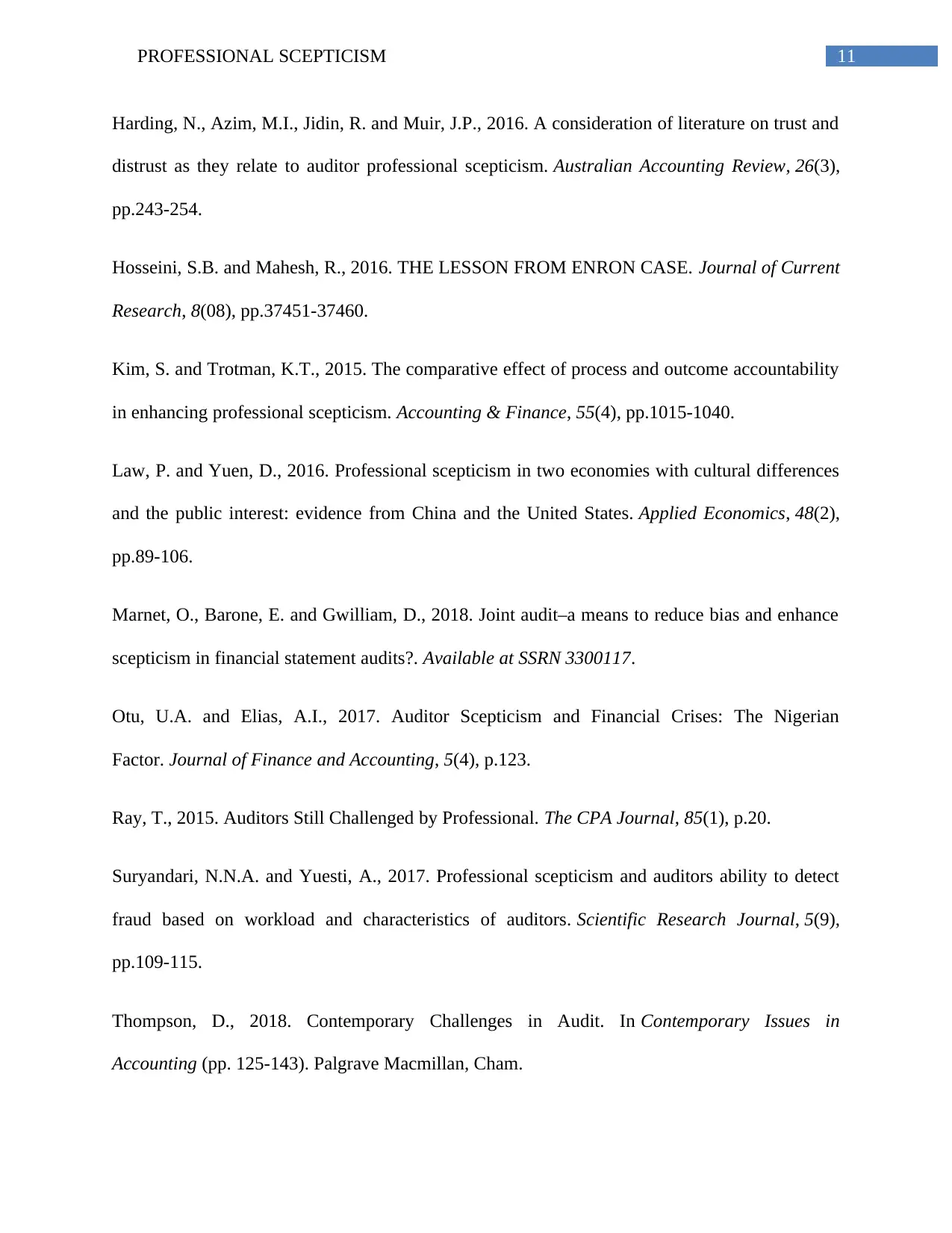
11PROFESSIONAL SCEPTICISM
Harding, N., Azim, M.I., Jidin, R. and Muir, J.P., 2016. A consideration of literature on trust and
distrust as they relate to auditor professional scepticism. Australian Accounting Review, 26(3),
pp.243-254.
Hosseini, S.B. and Mahesh, R., 2016. THE LESSON FROM ENRON CASE. Journal of Current
Research, 8(08), pp.37451-37460.
Kim, S. and Trotman, K.T., 2015. The comparative effect of process and outcome accountability
in enhancing professional scepticism. Accounting & Finance, 55(4), pp.1015-1040.
Law, P. and Yuen, D., 2016. Professional scepticism in two economies with cultural differences
and the public interest: evidence from China and the United States. Applied Economics, 48(2),
pp.89-106.
Marnet, O., Barone, E. and Gwilliam, D., 2018. Joint audit–a means to reduce bias and enhance
scepticism in financial statement audits?. Available at SSRN 3300117.
Otu, U.A. and Elias, A.I., 2017. Auditor Scepticism and Financial Crises: The Nigerian
Factor. Journal of Finance and Accounting, 5(4), p.123.
Ray, T., 2015. Auditors Still Challenged by Professional. The CPA Journal, 85(1), p.20.
Suryandari, N.N.A. and Yuesti, A., 2017. Professional scepticism and auditors ability to detect
fraud based on workload and characteristics of auditors. Scientific Research Journal, 5(9),
pp.109-115.
Thompson, D., 2018. Contemporary Challenges in Audit. In Contemporary Issues in
Accounting (pp. 125-143). Palgrave Macmillan, Cham.
Harding, N., Azim, M.I., Jidin, R. and Muir, J.P., 2016. A consideration of literature on trust and
distrust as they relate to auditor professional scepticism. Australian Accounting Review, 26(3),
pp.243-254.
Hosseini, S.B. and Mahesh, R., 2016. THE LESSON FROM ENRON CASE. Journal of Current
Research, 8(08), pp.37451-37460.
Kim, S. and Trotman, K.T., 2015. The comparative effect of process and outcome accountability
in enhancing professional scepticism. Accounting & Finance, 55(4), pp.1015-1040.
Law, P. and Yuen, D., 2016. Professional scepticism in two economies with cultural differences
and the public interest: evidence from China and the United States. Applied Economics, 48(2),
pp.89-106.
Marnet, O., Barone, E. and Gwilliam, D., 2018. Joint audit–a means to reduce bias and enhance
scepticism in financial statement audits?. Available at SSRN 3300117.
Otu, U.A. and Elias, A.I., 2017. Auditor Scepticism and Financial Crises: The Nigerian
Factor. Journal of Finance and Accounting, 5(4), p.123.
Ray, T., 2015. Auditors Still Challenged by Professional. The CPA Journal, 85(1), p.20.
Suryandari, N.N.A. and Yuesti, A., 2017. Professional scepticism and auditors ability to detect
fraud based on workload and characteristics of auditors. Scientific Research Journal, 5(9),
pp.109-115.
Thompson, D., 2018. Contemporary Challenges in Audit. In Contemporary Issues in
Accounting (pp. 125-143). Palgrave Macmillan, Cham.
⊘ This is a preview!⊘
Do you want full access?
Subscribe today to unlock all pages.

Trusted by 1+ million students worldwide
1 out of 13
Related Documents
Your All-in-One AI-Powered Toolkit for Academic Success.
+13062052269
info@desklib.com
Available 24*7 on WhatsApp / Email
![[object Object]](/_next/static/media/star-bottom.7253800d.svg)
Unlock your academic potential
Copyright © 2020–2026 A2Z Services. All Rights Reserved. Developed and managed by ZUCOL.





